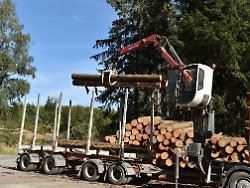Thursday, August 5th, 2021
Less management required
Forester: “Forest is always the whipping boy”
Only a small part of the forest in Germany develops naturally, the rest is used economically. At the “National Forest Summit”, Federal Environment Minister Schulze and Greens boss Habeck are calling for changes to reduce the strain on the forests.
Less use of wood, more closeness to nature – these demands were the focus of a “National Forest Summit” in the Eifel. Both Federal Environment Minister Svenja Schulze and the Greens federal chairman Robert Habeck spoke out in favor of new funding incentives to make forests more resilient with a view to climate change.
“The forest must be rebuilt or have the opportunity to rebuild yourself,” said Schulze in a greeting to the two-day conference to which the forest academy of the forester and author Peter Wohlleben in Wershofen, Rhineland-Palatinate, had invited. “The last few years have shown that many forests are unable to cope with the effects of climate change,” said Schulze. Supporting forest owners with 1.5 billion euros as a result of the drought and the Corona crisis was the right immediate measure, explained Schulze. “Now and in the future, we need forest funding that takes into account the ecosystem services of the forests as a whole and thus supports forest owners and communities who live up to their responsibility for the future of our forests in a special way,” she added.
Her ministry has therefore worked out key points for a new funding model “that inseparably links rewarding climate protection services with ambitious biodiversity standards”. In this way, the forest conversion to near-natural mixed forests with predominantly native tree species should be promoted and promoted in a targeted manner. The one-sided understanding of using the forest as a plantation for wood production no longer has a future, said Schulze and campaigned for five percent of the forest area in Germany to be left to natural development. So far, 3.1 percent of this has been achieved.
Previous users are to be compensated from funds
“The task cannot just consist of identifying natural forests,” replied Habeck. “The management as a whole must change.” Since the forest will continue to be stressed in the next few years and decades, use must be reduced. “That is the logical consequence.” To this end, he proposed the establishment of a “Forest Future Fund”, from which previous users could be compensated for the fact that use would be significantly reduced. In the timber industry there must also be a “closed cascade use”. This rules out that wood will continue to be used for disposable products such as paper.
“Wald is always the whipping boy,” said Wohlleben. “If anything is needed, the forest will be removed in case of doubt.” This can be seen in the installation of wind turbines in the forest, for which huge aisles would have to be cut. These should only be installed on already polluted areas such as along highways.
.
